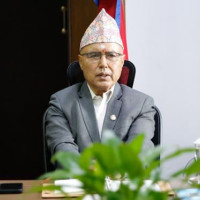- Wednesday, 28 January 2026
Nepal seeks preferential treatment to continue in trade with UK after LDC graduation
By A Staff Reporter,Kathmandu, Oct.1: Stakeholders have stressed on retaining the preferential treatment to Nepali goods in the markets of the United Kingdom and enhancing the quality of Nepal-made products in after years of the country's graduation to the 'developing country' status from the Least Developed Country (LDC).
Speaking at an interaction on 'Enhancing bilateral trade relations between the UK and Nepal through the Developing Countries Trading Schemes (DCTS)' organised by the British Embassy in Kathmandu on Monday, they said that Nepal must make the most of the DCTS programme.
Nepal exports a negligible amount of goods to the UK under the DCTS preference compared to its regional neighbours, India leads the chart while Bangladesh and Pakistan follow the former.
The DCTS includes market access, aid for trade, and private sector development programme which primarily focuses on supporting the SMEs with export of niche products and services.
Implemented since June 2023, DCTS is a unilateral preference offered by the UK 'duty free quota free' access on 99 per cent of goods from the developing countries.
Ambassador of the UK to Nepal, Rob Fenn, said that the UK would like to support Nepal in enhancing the quality of its products and taking them to the international markets. "Our efforts are for forging match-making between British fashion brand and Nepali Pashmina producers," he informed.
The UK has long been collaborating with the pashmina industry through the programmes like training Chyangra (mountain goat) farmers and quality enhancement. "We know that there are challenges in the process and DCTS is only the part of the solution. There is a need to better implement the single window system in the business, digitalising the customs, enhancing women's participation and removing trade barriers," said Fenn.
Fabian Hartwell, Regional Trade Development Advisor – South, Central, Southeast Asia of the FCDO, said that the programme will assess the environment of the selected factories, establish Business-to-Business connection, facilitate Nepali pashmina and felt producers to exhibit their products in an exhibition in London, and launch a product during the London Fashion Week. These activities will be implemented before March 2025.
After that, product development will be initiated in collaboration with Stella McCartney, participation will be made in fashion shows, and capacity building programmes will be continued.
Nepal will continue to receive the benefits of comprehensive preferences till 2029 after its graduation from the Least Developed Country (LDC) in 2026 in line with the policy to have the facility after three years from the graduation.
Gobinda Bahadur Karkee, Secretary of the Ministry of Industry, Commerce and Supplies (MoICS), said that although Nepal enjoys the duty-free treatment of 99 per cent products as a LDC in the UK, the country's utilisation rate of the facility is very low.
He pointed to the need to provide adequate information to the producers and exporters about the preferential treatment facility. He urged the private sector, entrepreneurs and exporters to enhance their knowledge and technical capability about the facility including the DCTS provided by the UK.
Chandra Prasad Dhakal, President of the Federation of Nepalese Chambers of Commerce and Industry (FNCCI), said the DCTS holds high significance in case of Nepal as it is likely to lose the preferential treatment for its goods in the post-graduation scenario.
The private sector must be aware of the international quality standards and complying with them in order to make the international trade more sustainable and beneficial to the national economy, said Dhakal.
Vice-President of the Confederation of Nepalese Industries (CNI), Birendra Raj Pandey, said that there is a need to explore opportunities in Nepal-UK trade relations.
The UK is the fourth largest export market for Nepal with the total exports of Rs. 3.08 billion in the last Fiscal Year 2023/24 while total imports to Nepal from the UK stand at Rs. 7.08 billion resulting in trade deficit of Rs. 4 billion.
Last year, the total size of Nepal's international trade was Rs. 1745.36 billion.















